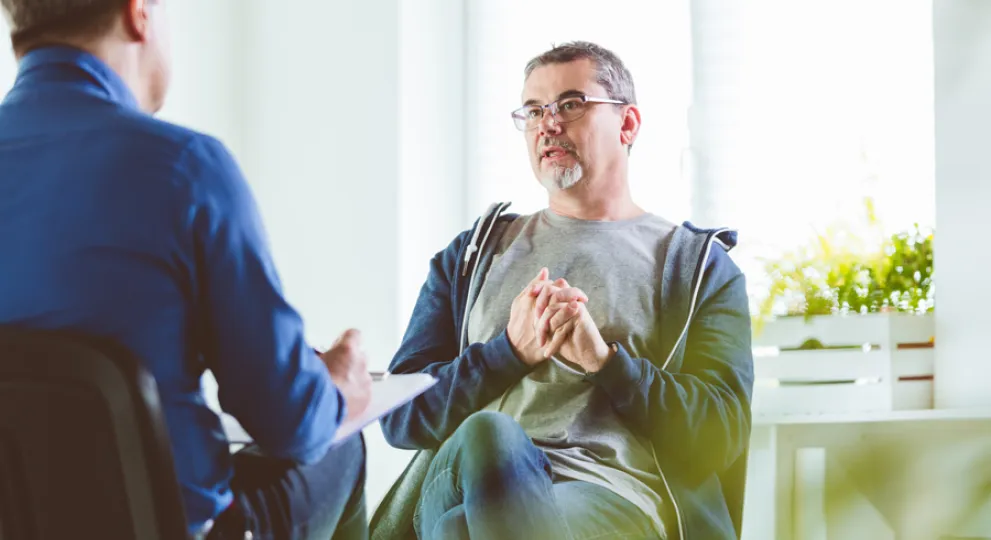Guilt is a common emotion when living with cancer. Here are ways to help cope with it.
Guilt is a common emotion when living with cancer. Here are ways to help cope with it.

Asking why is a part of the coping process when you’re living with cancer. And if the questions you might be asking yourself — Why me? What could I have done differently? — lead to feelings of guilt, you’re not alone.
But cancer is not your fault. And learning to cope with guilt may be an important part of your overall well-being when you’re living with cancer. By understanding your feelings and seeking support, you may be able to channel any guilt you’re feeling into positive thoughts and actions.
There are different types of guilt people may experience after a diagnosis of cancer. These are listed below, along with small, easy actions called Microsteps that you may consider taking to cope with guilt. As always, consult with your care team for the management practices that are best for you.
Guilt about getting sick
Nobody deserves to get cancer — it’s a complex disease with many factors beyond any person’s control. Still, after being diagnosed, some people blame themselves for lifestyle choices or past actions they believe may have led to their illness. For example:
“I shouldn’t have smoked.” “I should have eaten better.”
“I should have taken better care of myself.”
The thoughts you have about cancer and the story you tell yourself can make a difference. Blaming yourself can make it harder to motivate yourself to manage your health.
Reframing a negative thought.
If you catch yourself judging yourself for a past behavior, try reframing it to something positive and proactive like, "I can make healthier choices now." It’s a small but important mindset shift that may help reduce self-blame and give you a more positive outlook on managing your health.
Setting one small, achievable goal that makes you feel good about yourself.
For example, adding one more serving of vegetables to each meal or taking a short walk every day. Focusing on what you can control can help you move beyond negative thoughts or judgments about the past.
Sharing your story with another person living with cancer.
Connecting with someone else can be one of the most powerful ways to realize you are not alone. If you’re comfortable, you may find it useful to open up about any feelings of guilt and blame.
Shame about your body
Some cancers may be easier to talk about than others. Fears about stigma may make it harder to talk about some cancers or ask for help.
For example, people with cancers affecting intimate body parts, such as breast cancer or prostate cancer, may feel shame or embarrassment as they face changes to their sexual identity or body image. Colorectal cancer, which involves the bowel, might feel embarrassing to discuss.
Saying an affirmation that helps you feel better about your body.
Positive affirmations that promote self-acceptance and body positivity may help you frame your cancer journey in a more positive way. For example, you can tell yourself “I love my body” or “My body deserves care.”
Writing down your “script.”
If talking about your cancer feels scary or embarrassing, consider writing down your thoughts and feelings in the form of a script. It can be brief and straightforward, or longer if you have more to say. Practicing this script may help you feel more prepared and less anxious when discussing your health with others.
Using medical terms to describe your cancer.
Using medical language to describe your symptoms may make conversations feel less personal and therefore less embarrassing. Consider taking some time to research your condition so you can learn and practice using terms you feel comfortable with.
Guilt about needing help
Asking for help can be hard, especially when you value your independence. People living with cancer often feel guilty if they think they might be burdening their loved ones with their needs. But asking for help is not a sign of weakness — it’s an important part of every cancer journey.
Being specific about what you need.
When asking for help, try to be clear and specific about what you need and why. This may make it easier for others to give the exact support you require. For example, if you have appointments every Monday, let a friend know you’d like them to drive you because their company cheers you up and helps you feel less anxious.
Telling someone how their help makes a difference.
When asking for support, try letting the person know how that support benefits you. How does it make your life easier? Does it make you feel seen and loved? You don’t need to justify asking for help, but sharing how it helps you can be a powerful motivator for others and may help them understand your situation.
Survivor’s guilt
Survivor’s guilt is a specific type of guilt experienced by people who have survived cancer when others have not. You may feel sad or unworthy. You may ask, “Why am I here and they’re not?”
As you look back on your cancer experience, guilt can show up in other ways. For example, you may feel you didn’t suffer as much as someone else, or feel bad about the way your illness affected your loved ones along the way.
Reminding yourself that you are not the first.
When you were first diagnosed with cancer, it may have helped to know that you weren't alone. If you find out you're in remission, it's important to understand that you're not the first to do that either. You might tell yourself, "Many people before me have been where I am, and I don’t have to figure it out by myself.”
Owning your positive feelings.
Remembering what you’ve been through and celebrating victories both large and small can be a key part of moving forward in your life. You may find meaning in allowing yourself to feel joy, relief, and other positive emotions.
Carrying the memory of a loved one you’ve lost.
If you’re feeling survivor’s guilt because another loved one with cancer didn’t survive, give yourself space and time to mourn your loss. Remind yourself that being here means you can carry the memory of your loved one with you.
Finding one small way to give back to the cancer community.
Some survivors find that giving back is a way to channel guilt into something meaningful. Volunteering for cancer advocacy groups, becoming a mentor, and sharing your story are just a few examples. As someone who has gone through the journey, you may be in a position to share practical advice and give inspiration to others.
Developed with Thrive Global













